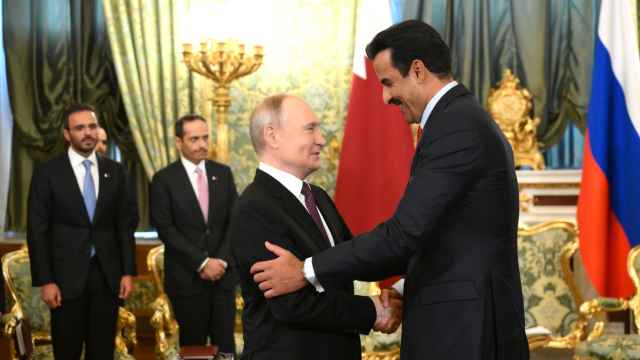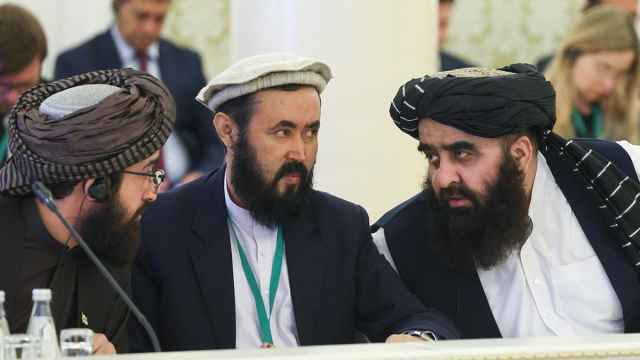Recently appointed Defense Minister Sergei Shoigu on Friday named Colonel General Valery Gerasimov the new head of the General Staff, which wields operational control over the armed forces.
The appointment was anticipated following Tuesday's ouster of longtime Defense Minister Anatoly Serdyukov amid a corruption scandal. Three deputy ministers may soon be fired as well.
Shoigu wants to build a loyal team, military analysts told The Moscow Times, adding that Shoigu would likely pick those he would be comfortable working with and who would be grateful for their appointment.
The minister announced the decision that Gerasimov would replace former chief Nikolai Makarov at a Kremlin meeting attended by Gerasimov and President Vladimir Putin.
"You're an experienced person," Putin told Gerasimov, according to a transcript on the Kremlin website. "I think the minister has chosen a suitable candidate, and I hope you will work effectively and efficiently."
Gerasimov, 57, said he would do his best to achieve all the goals set for the military, which Putin said included rearmament of the Army and Navy and completion of the restructuring of the armed forces.
Putin the same day fired the first deputy defense minister, Alexander Sukhorukov, and appointed Arkady Bakhin, commander of the Western Military District, in his stead. He also named aerospace defense commander Oleg Ostapenko a deputy defense minister, the Kremlin website announced.
Three other deputy defense ministers — Tatyana Shevtsova, responsible for housing and finances, Dmitry Chushkin, responsible for information equipment policy, and Yelena Kozlova — may be fired soon, Kommersant reported, citing undisclosed sources.
Shevtsova may be replaced by two deputies, Kommersant said, adding that Moscow region Deputy Governors Roman Filimonov and Dmitry Kurakin are candidates to oversee the ministry's finances in her place.
Three of Serdyukov's eight deputy ministers will likely keep their positions: Nikolai Pankov, responsible for cooperation with the Emergency Situations Ministry, which Shoigu previously headed; Dmitry Bulgakov, who oversees combat service support units that function well; and Anatoly Antonov, who oversees international activities and is one the best negotiators of the missile shield issue, Kommersant said.
Media reports had predicted that Gerasimov would replace Makarov, citing the latter's closeness to former Minister Serdyukov, ousted after a firm that had been under his control was suspected of unlawfully selling ministry property.
The U.S. ambassador to Russia, Michael McFaul, had recently told The Moscow Times that the former General Staff chief improved bilateral military ties by supporting direct military-to-military contacts between Russian and U.S. generals.
He added that the supplying of NATO's non-lethal supplies to Afghanistan over Russian territory had gone from 4 or 5 percent to "well over" 50 percent during U.S. President Barack Obama's first term.
Gerasimov served as first deputy head of the General Staff from 2010 until April of this year, when he was removed from the post by Makarov. Since then he served as commander of the Central Military District, one of the country's four regional command posts.
Igor Korotchenko, head of the Defense Ministry's public advisory council, said by phone that "professionalism" and "confidence in being comfortable working with these people" would be primary criteria in Shoigu's appointments to the ministry's top brass.
But military analyst Alexander Golts said by telephone that "the candidacy is not important. … They are appointed in order to make them loyal to Shoigu." He added, "This is the bureaucratic logic in Russia."
The new General Staff chief has combat experience, having served as a commander in the North Caucasus during the second Chechen war. He personally took part in the high-profile 2001 arrest of a colonel later convicted of abducting and murdering an 18-year-old Chechen woman. Gerasimov testified at the 2003 trial that the colonel had no right to detain the woman or conduct a sweep of her village.
Vladimir Komoyedov, head of the State Duma's security committee, said Gerasimov should "prepare military forces for effective actions in the Arctic," broaden powers of the General Staff of all kinds of forces, boost the amount of military intelligence operations outside the country and in space, and maintain the army recruited both from conscripts and contract officers, RIA-Novosti reported Friday.
Korotchenko told RIA-Novosti that Gerasimov's other tasks should be modernizing the Army's and Navy's weapons and military equipment and preparing counter measures to the U.S. missile shield in Europe.
Viktor Ozerov, head of the Federation Council's defense and security committee, forecast that some generals who resigned under Serdyukov over disagreements with military reforms would return to the Army, Interfax reported Saturday.
Meanwhile, investigators have detected 10 more instances of purportedly unlawful sales of Defense Ministry property worth about a billion rubles ($32 million), undisclosed law enforcement sources told Interfax on Friday.
The sales were detected as part of the Investigative Committee's probe into five criminal cases opened late last month in connection with allegedly illegal sales of military property — including sanatoriums, guest houses and land worth $95.5 million — by the Oboronservis firm, which was chaired by Serdyukov until last year.
Investigators also located a key suspect in the criminal probes — Yevgenia Vasilyeva, former head of the Defense Ministry's property relations department, who was rumored to have been Serdyukov's lover, Interfax reported Saturday.
Vasilyeva is staying at a Moscow hospital where she had undergone a minor surgery, a source with knowledge of the situation told Interfax.
Another suspect — Yekaterina Smetanova, former head of the Ekspert legal support agency, whom media reports named as an agent of Oboronservis authorized to sell Defense Ministry assets — has agreed to cooperate with the investigators, Interfax said Saturday.
Staff writer Jonathan Earle contributed to this report.
Related articles:
A Message from The Moscow Times:
Dear readers,
We are facing unprecedented challenges. Russia's Prosecutor General's Office has designated The Moscow Times as an "undesirable" organization, criminalizing our work and putting our staff at risk of prosecution. This follows our earlier unjust labeling as a "foreign agent."
These actions are direct attempts to silence independent journalism in Russia. The authorities claim our work "discredits the decisions of the Russian leadership." We see things differently: we strive to provide accurate, unbiased reporting on Russia.
We, the journalists of The Moscow Times, refuse to be silenced. But to continue our work, we need your help.
Your support, no matter how small, makes a world of difference. If you can, please support us monthly starting from just $2. It's quick to set up, and every contribution makes a significant impact.
By supporting The Moscow Times, you're defending open, independent journalism in the face of repression. Thank you for standing with us.
Remind me later.






